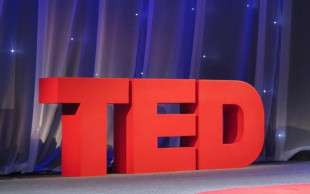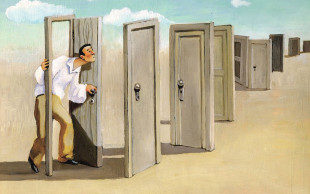Try standing really close to a wall. Facing the wall, move just a little closer, such that your toes are just touching the wall. Perhaps you’ll start to find it difficult to turn your head to the left or the right, and your vision becomes narrowed. You may begin to tune out the sounds around because of the looming wall in front of you. This might be a familiar feeling for you at this point in time. No options ahead. No possibilities. No choices. You’re stuck.
Taking care of ourselves is a maxim often preached and rarely practiced, and sometimes without noticing we become stuck in a situation we cannot escape from - a familiar yet dreadful feeling that you cannot explain. It can turn into a kind of helplessness when you realise that you have no other choice but to accept what is thrust upon you. I remember playing the old school Digimon and Pokemon games when I was young(er), and how people got excited with new discoveries in the game.
There were secret codes you could use while battling? There were secret gardens available? We could clone our Pokemons? Those possibilities were so fascinating because they changed the boundaries of the game. They changed how we played the game. They changed what the game was about.
We are always looking for new pathways and new routes to take. No child plays the basic game of catch without modifications because that is way too boring. No child fails to imagine. Given some randomly-placed pieces of furniture in the living room, the floor turns into lava, and a new game begins.
And here’s the thing: we stop playing games as we grow older. We stop having fun. We stop exploring because we have stopped being curious. And when we stop being curious, we cease to move forward. We cease to live abundantly. And we end up feeling stuck. Nothing’s changed for a long time. It’s stale.

So let’s change the game. Let’s change the ways things are. Let’s change the rules. Let’s change the way we look at adversities. Let’s look at the possibilities through the lens of Neuro-Linguistic Programming (NLP). The Chinese characters for ‘crisis’ are read “Wei Ji”. And here’s the thing. When you loosely translate that, it becomes really interesting. What we have is a combination of danger and opportunity.
From the NLP world, here are five new ways of thinking that can change your game and turn your attention towards the opportunities within your adversities:
1) Discard the ‘Blame’ frame and pick up the ‘Outcome’ frame.
In challenging times, it’s easy to be caught up with the question, “Who is responsible for this?” Somehow, we temporarily feel more appeased when we can assign the blame to something or someone. I used to work under a boss who did just that. There was an incident when she had made a blunder, albeit out of good intentions!
Nevertheless, instead of looking past that apparent mistake, she dwelled upon it and even attempted to assign the blame to things or other people. Of course, that ended up blowing the matter out of its original proportions. In that ‘Blame’ frame, we may start living in misery or anxiety, and a way through which one can start moving out of such misery is to gently ask yourself, “What do I want out of this? What am I trying to achieve?”
These questions will shift your attention towards what you can do from this point to get to where you want to be.
2) Discard the ‘Sameness’ frame and pick up the ‘Contrast’ frame.
It may be difficult to shift your attention at first and what we can do is to first make this little tweak to the way we see this world: from “Sameness” to “Contrast”. Looking at your situation with the “Sameness” frame would sound like this, “It’s always like this. Things are just like that. It’s always the same thing.” With such a frame, we lose control over our lives.
It’s good to follow the rules at certain times because rules provide some kinds of structure and stability. And when we want to change the game, it’s about transcending those rules. That’s innovation. That’s having the courage to think out of the box so that you can look at a particular situation from an angle that is uniquely yours. In that process, you give a piece of yourself to this world - a piece that's different, unique, and special.
During these difficult times with the Covid pandemic, many artists around the world have embraced the opportunity to move their work online, and we’ve seen the myriad of ways through which art can still exude aliveness even via virtual platforms.
While it’s easy to look at the limitations at hand and box ourselves in, we can choose instead to reshape those boxes so that they fit the game that we want to play, and the journey that we want to take.
It’s good to ask ourselves, “What can we do to transcend the ‘rules’ in our lives to change the game? How can we be in control of our journeys in life? How can we make the choices in order to get to where we want to be?”

3) Discard the ‘Helpless’ frame and pick up the ‘As If’ frame.
No one likes to be helpless. And when we think that we don’t have choices, we end up feeling helpless? What would happen if I tell you that there’s always a choice? The thing about our experiences in life is this: when we change the way we look at them, the things we look at change. That’s an adaptation of a quote by late Dr Wayne Dyer, and it reveals the choices and decisions that we can make to change our reality and experiences, to move forward in our lives.
When you look at things through the “Helpless” frame, it sounds like, “I cannot do anything about it. I don’t understand.” How can we shift in our thinking to ask a more productive question instead, “What would it be like if I...?” For a moment now, pause and ask yourself these questions:
“If I could be anything I would like to be, what would I see myself doing?” “What would I see around me?”
“What would I hear people saying? What would I say to myself?”
“How would I feel?”
Let your imagination run wild. Be that child again who is always looking for new pathways and new routes to take. Change the game right now in the way you think, and the game you play will slowly change.
4) Discard the ‘Me’ frame and pick up the ‘Ecology’ frame.
And when you start to realise the control that you have in your life, it’s also time to keep the big picture in mind. Picking up the “Ecology” frame implies that you are concerned about how your change can affect the larger systems and networks of relationships in your life. Instead of looking out only for yourself, it’s time to zoom out.
Ask questions like, “How will this be in the long run? Who else is affected by my choices and decisions? How can I use the power that I have in my choices to make this world a better place?” When you begin to have the bigger picture in mind, you’ll also start to see the role you play in the larger systems and circles that you live in, and the consequent power you have to influence others and to make a change.
When we look outwards, we channel our resources to the greater good for this world, and that’s when your empowerment becomes visible and tangible. That’s when you know you are an agent of change.

5) Find out what’s important to you and set a clear goal for yourself.
Finally, as an agent of change in this world, when you have transcended the rules set by others, it’s time to create your own game. It’s time to set your own rules. It’s time to move forward with confidence and gusto, simply because you are destined for greatness.
Ask yourself what you truly value, what’s truly important to you, and what you truly want. Act and think according to what’s important to you. And make clear and specific goals for yourself – goals that are aligned with who you are deep down inside.
In this way, you can lead a life of certainty and congruence, you can hear the weight of your words when you speak, and you can see yourself acting with gravitas despite the circumstances around you: despite any form of adversity that you may face.
Choose to step away from the wall that inhibits your growth, and your vision will broaden. You’ll start to be aware of the sounds around you, and you’ll see ways of getting around things with the options and possibilities in front of you.
How far do you want to go?
---
Join Darryl in his monthly webinars through which participants get to better understand how their brain works.

















